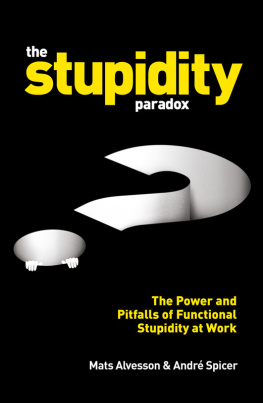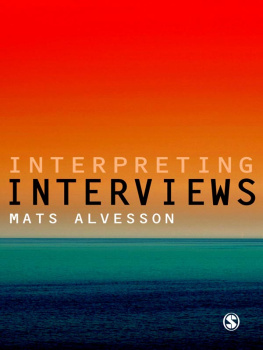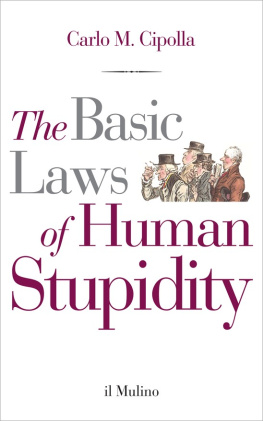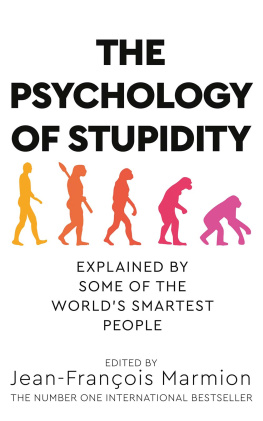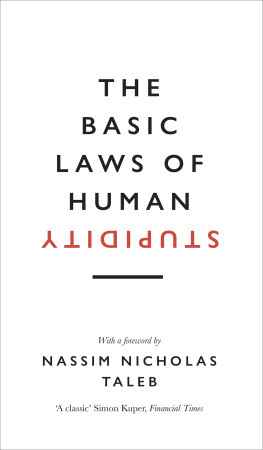Mats Alvesson - The Stupidity Paradox: The Power and Pitfalls of Functional Stupidity at Work
Here you can read online Mats Alvesson - The Stupidity Paradox: The Power and Pitfalls of Functional Stupidity at Work full text of the book (entire story) in english for free. Download pdf and epub, get meaning, cover and reviews about this ebook. year: 2016, publisher: Profile Books, genre: Business. Description of the work, (preface) as well as reviews are available. Best literature library LitArk.com created for fans of good reading and offers a wide selection of genres:
Romance novel
Science fiction
Adventure
Detective
Science
History
Home and family
Prose
Art
Politics
Computer
Non-fiction
Religion
Business
Children
Humor
Choose a favorite category and find really read worthwhile books. Enjoy immersion in the world of imagination, feel the emotions of the characters or learn something new for yourself, make an fascinating discovery.
- Book:The Stupidity Paradox: The Power and Pitfalls of Functional Stupidity at Work
- Author:
- Publisher:Profile Books
- Genre:
- Year:2016
- Rating:4 / 5
- Favourites:Add to favourites
- Your mark:
- 80
- 1
- 2
- 3
- 4
- 5
The Stupidity Paradox: The Power and Pitfalls of Functional Stupidity at Work: summary, description and annotation
We offer to read an annotation, description, summary or preface (depends on what the author of the book "The Stupidity Paradox: The Power and Pitfalls of Functional Stupidity at Work" wrote himself). If you haven't found the necessary information about the book — write in the comments, we will try to find it.
The Stupidity Paradox: The Power and Pitfalls of Functional Stupidity at Work — read online for free the complete book (whole text) full work
Below is the text of the book, divided by pages. System saving the place of the last page read, allows you to conveniently read the book "The Stupidity Paradox: The Power and Pitfalls of Functional Stupidity at Work" online for free, without having to search again every time where you left off. Put a bookmark, and you can go to the page where you finished reading at any time.
Font size:
Interval:
Bookmark:
the
stupidity
paradox
About the authors
Mats Alvesson is Professor of Business Administration at the University of Lund, Sweden, University of Queensland and Cass Business School, City University, London. He has published extensively across a wide range of organisational behaviour topics and issues, is one of the most frequently cited European researchers in management and organisation studies and a sought-after speaker around the globe. He is the author of The Triumph of Emptiness , Oxford University Press and Reflexive Leadership , Sage (with Martin Blom and Stefan Sveningsson).
Andr Spicer is Professor of Organisational Behaviour at Cass Business School, City University, London, known for his research in the areas of the human side of work, leadership and ethics. He is widely published in both academic literature and the general business media and is a frequent commentator on sustainable business, behaviours at work and business culture. He is the author of The Wellness Syndrome , Polity Press (with Carl Cederstrm).
the
stupidity
paradox
The power and pitfalls of functional stupidity at work
Mats Alvesson & Andr Spicer

First published in Great Britain in 2016 by
PROFILE BOOKS LTD
3 Holford Yard
Bevin Way
London WC1X 9HD
www.profilebooks.com
Copyright Mats Alvesson and Andr Spicer, 2016
The moral right of the author has been asserted.
All rights reserved. Without limiting the rights under copyright reserved above, no part of this publication may be reproduced, stored or introduced into a retrieval system, or transmitted, in any form or by any means (electronic, mechanical, photocopying, recording or otherwise), without the prior written permission of both the copyright owner and the publisher of this book.
A CIP catalogue record for this book is available from the British Library.
eISBN 978 1 78283 202 7
Two things are infinite: the universe and human stupidity; and Im not sure about the universe.
Albert Einstein
The whole problem with the world is that fools and fanatics are always so certain of themselves, and wiser people so full of doubts.
Bertrand Russell
To be stupid, selfish, and have good health are three requirements for happiness, though if stupidity is lacking, all is lost.
Gustave Flaubert
Contents
Preface
A few years ago, both of us were invited to an official dinner. We found a place at a table together, sat down and started to catch up. One of us described how his student had recently been doing an internship with a powerful government department. Over the period of three months, the student had to help write a report. This was not the kind of report that would be shelved at once and read by no one. This report would set out an entirely new policy area for the government. You might think this was a difficult job requiring a team of very experienced people doing in-depth research. Apparently not. The student worked largely on her own. Her manager was in his twenties. When she asked him what was the most important aspect of developing a really good report, he replied: One or two impressive PowerPoint slides. This struck both of us as really stupid. How could an important new government policy that would affect millions of people be based on a few PowerPoint slides created by an intern who was managed by a twenty-something?
Was this just a one-off case of stupidity, we asked, and began to swap stories from the dozens of organisations we have studied over the years. We talked about top executives who rely on consultants PowerPoint shows rather than careful analysis, headmasters and teachers who spend their time enthusiastically talking about vague but positive organisational values rather than educating students, managers who try to be inspiring leaders even though their subordinates are not interested and are capable of working on their own, senior figures in the armed forces who prefer to run rebranding exercises rather than military exercises, engineers who overlook fatal flaws, IT analysts who prefer to ignore problems so as not to undermine the upbeat tone of their workplace, senior executives who keep on launching programmes for change yet have no serious interest in the outcome, and newspaper editors who are more interested in finding the perfect mixture of celebrity gossip than in preparing themselves for profound changes in their industry.
When we came to the topic of universities, we realised there were just too many kinds of stupidity to mention: pointless rebranding exercises, ritualistic box-ticking, misguided attempts at visionary leadership, thoughtless pursuit of rankings, to mention just a few. We were worried that all this stupidity was detracting from the core purpose of our institutions: to educate students, develop new knowledge and contribute to the wider community.
As we piled up all these examples, we started to realise that something was very wrong here. We are constantly told that to be competitive we must be smart. We should be knowledge workers employed by knowledge-intensive firms that trade in the knowledge economy. Our governments spend billions on trying to create knowledge economies, our firms brag about their superior intelligence, and individuals spend decades of their lives building up fine CVs. Yet all this collective intellect does not seem to be reflected in the many organisations we studied. Much of what goes on in these organisations was described often by employees themselves as being stupid.
Far from being knowledge-intensive, many of our most well-known chief organisations have become engines of stupidity. We have frequently seen otherwise smart people stop thinking and start doing stupid things. They stop asking questions. They give no reasons for their decisions. They pay no heed to what their actions cause. Instead of complex thought we get flimsy jargon, aggressive assertions or expert tunnel vision. Reflection, careful analysis and independent reflection decay. Idiotic ideas and practices are accepted as quite sane. People may harbour doubts, but their suspicions are cut short. Whats more, they are rewarded for it. The upshot is that a lack of thought has entered the modus operandi of most organisations of today.
But one thing puzzled us: why was it that organisations which employed so many smart people could foster so much stupidity? After some discussion, we realised something: smart organisations and the smart people who work in them often do stupid things because they work at least in the short term. By avoiding careful thinking, people are able to simply get on with their job. Asking too many questions is likely to upset others and to distract yourself. Not thinking frees you up to fit in and get along. Sometimes it makes sense to be stupid. Perhaps we live in an age where a certain type of stupidity has triumphed.
But that was not the end of the story. As we talked more, we realised that while being stupid might work in the short term, it could lead to bigger problems in the long term. When people buy into baseless ideas it can create a nice feeling today, but lay traps for tomorrow. At the time, the global financial system was in turmoil. One of the reasons was that banks had bought financial products they didnt fully understand. In the short term this didnt matter, as the banks continued to make money from these products anyway. But when financial markets soured, this lack of comprehension sparked disaster.
If organisations create so much stupidity, what does that mean for the people who run them? The fact is, many managers try to ensure that smart people dont use their intellect. There are many tactics that are used to do this. Anyone who has spent even a few days in a large firm knows them well. But to us it seemed that within modern organisations there is just too much stupidity, and that what is needed is a concerted effort to minimise some pointless practices that we find all around us at work. As we reflected further on this problem, we started to identify some very practical steps that can be used to destupidify our organisations.
Next pageFont size:
Interval:
Bookmark:
Similar books «The Stupidity Paradox: The Power and Pitfalls of Functional Stupidity at Work»
Look at similar books to The Stupidity Paradox: The Power and Pitfalls of Functional Stupidity at Work. We have selected literature similar in name and meaning in the hope of providing readers with more options to find new, interesting, not yet read works.
Discussion, reviews of the book The Stupidity Paradox: The Power and Pitfalls of Functional Stupidity at Work and just readers' own opinions. Leave your comments, write what you think about the work, its meaning or the main characters. Specify what exactly you liked and what you didn't like, and why you think so.

